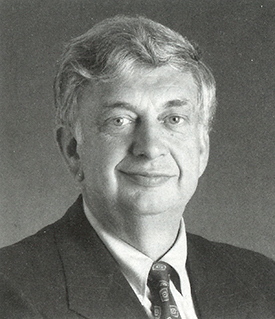Slash or invest? Legislature faces choices on higher education

Gov. Mike Lowry
The fate of budget cuts, tuition increases, instructional improvements and salary hikes rests with the state of Washington’s revenue forecast for the next two budget years, due March 15.
Both Gov. Mike Lowry and legislative leaders are delaying their 1993-95 state budget plans until they receive the latest revenue projections. Based on previous forecasts, the state faces a $1.3-billion deficit over the next two years. Lawmakers are worried that with job cuts at Boeing, the deficit will grow.
Until the new numbers are in, Olympia is working off of December budget proposals presented by former Gov. Booth Gardner. One plan avoided cutting higher education by raising tuition and imposing a 0.4-cent sales tax hike. Alternatively, for a no-tax-increase budget, Gardner proposed deep budget reductions of 12.9 percent or $84 million for the University.
While other state agencies suffered from double-digit cuts in his tax-increase budget, Gardner imposed only a 3-percent “efficiency savings” on the UW budget. He then added program enhancements including about $10 million for enrollment increases at the main campus and the branches, $8.6 million for undergraduate education improvements and $1.8 million to recruit and retain minority students.
The ex-governor’s tax-increase plan would allot $722 million to the UW for 1993-95 with $546 million coming from taxes and $176 million from students. The UW’s original request was for $793.9 million.
“We are appreciative of the governor’s efforts to protect higher education,” says President William P. Gerberding. “The political leadership of this state has made a substantial and wise investment in higher education in recent years. We are hopeful and we believe that this commitment will persist even in the present budgetary circumstances.”
Not everyone is happy with the Gardner proposals, however. Students are fighting a 25-percent increase in tuition over two years. Currently UW resident students pay 33 percent of the cost of their undergraduate education. Gardner suggests raising that portion to around 40 percent. For resident undergrads, the current $2,253 annual bill would jump to $2,637 this fall and to $2,812 in the fall of 1994.
This new amount would still be below the average in-state, undergraduate tuition and fees at the UW’s 24 peer universities, which is $2,904 for the current academic year.
Director of Government Relations Bob Edie says the University administration will support tuition increases only if they are necessary to prevent budget cuts and the money stays on campus rather than being transferred to the state’s general fund. “There also needs to be a corresponding increase in financial aid so the neediest students won’t get hurt,” he adds. “That increase should be targeted to students at public colleges and universities who are facing this large tuition increase.”
Faculty and staff are also unhappy with Gardner’s plan for a two-year salary freeze. If Gov. Lowry and the legislature agree with Gardner, Edie says faculty and staff salaries “would definitely lose ground compared to our peers.” But, he notes, a salary freeze is preferable to deep budget cuts and massive layoffs.
There is also a portion of Gardner’s proposal that displeases UW officials. In a surprise announcement, Gardner suggested merging the UW-Bothell branch with a proposed Eastside community college to create a four-year state college called “Cascade State University.”
The new institution would be a regional university that “emphasizes student instruction over faculty research,” according to Gardner’s budget plan. Gardner said it would save “millions of dollars” by consolidating the costs of two separate campuses. It would also increase access to higher education.
Edie says the initial announcement “stunned” UW officials and key legislators who were unhappy with Gardner’s action since it bypassed a master plan for the state written by the Higher Education Coordinating Board. That plan calls for a “2 plus 2” approach, where students get their first two years of higher education at a community college and then earn their bachelor’s and graduate degrees at a branch of the UW or WSU.
“A new regional university is a sharp departure from existing state policy,” Edie says.
While the proposed new university is a question mark, the Gardner tax-hike budget does include more funding for both UW branches over the next two years. The plan would add 80 new fulltime openings at Bothell and 100 new full-time slots in Tacoma. The openings would enable both branches to offer a bachelor’s degree in business and an education certification program. In addition, Tacoma would offer a systems engineering degree.
The Gardner budget also includes 160 new full-time openings in the Seattle campus evening degree program plus 30 openings for nursing.
The University is pleased with Gardner’s 1993-95. capital budget. Its top UW item is $90.5 million for a new computer science/electrical engineering building. Other important capital items include $32.6 million to renovate the old Physics Hall once the new Physics Building opens.
The capital budget for the branch campuses was a mixed blessing. While the plan gives UW-Tacoma $25 million to begin renovation and construction at its downtown campus, UW-Bothell would get only $9 million to begin planning infrastructure work. “That’s a disappointment,” says Government Relations Associate Director Sheral Burkey. “It will not get us where we want to be by 1996. This would delay the opening of the campus at its permanent site.”
Temporary siting of a new community college at the Bothell campus, what officials call “co-location,” and the Cascade State University proposal will be issues to be worked out as the legislative session progresses, she adds.
For more information on the UW and the state budget, call the Legislative Support Network at (206) 543-0540 or 1-800-AUW-ALUM. To contact your representative in Olympia, call 1-800-562-6000.